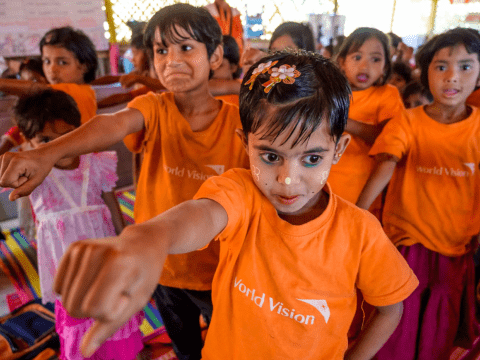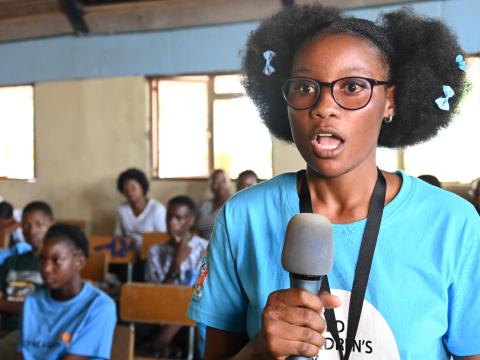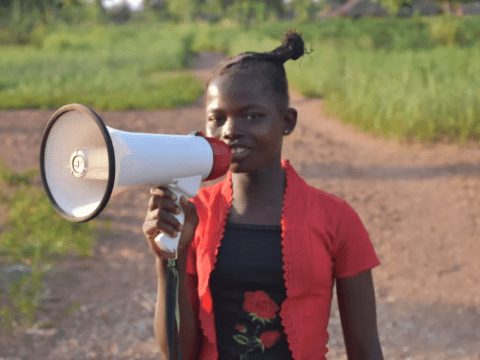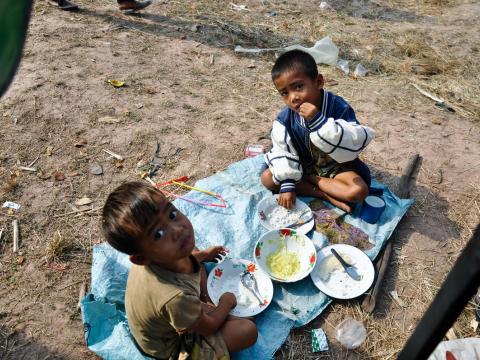
Violence kills a child every 5 minutes: but I’m not driven to despair
After decades working to protect children Bill Forbes shares three things that keep him hopeful that a violence-free future is within reach.
During my 25 years in child protection, I and my colleagues and peers, have seen some real wins: harmful policies changed, child abusers stopped, children finding safe spaces to live, learn and flourish. Sadly, we have also faced too much heartbreak: seeing hard-earned progress reversed; monumental efforts yielding minimal improvement; and children facing increased not decreasing levels of violence.
The efforts of people around the world to prevent and respond to children experiencing violence is truly inspiring and also is sometimes quite costly to their spirits and well-being. Yet, according to the UN, violence against children is at an all-time high and continues to rise: each year 1 billion children experience violence.
Knowing the fight for peace continues
Something that keeps me going, that stops me from despairing is the knowledge that thousands of people refuse to allow violence against children to continue. In only a few weeks’ time, many of those, from 120 countries, will make history by attending the inaugural Global Ministerial Conference on Ending Violence Against Children in Bogota, Colombia.
Government ministers, UN agencies, children, and NGOs will gather to solidify commitments and actions to protect children. Throughout our preparation, we at World Vision have been asking ourselves and other stakeholders hard questions about what is different about this conference? One answer is that it is not going to be a one-time event, but rather a catalyst for transformative change, the next chapter of global child protection.
I am proud of World Vision’s decades of child protection programming, advocacy and mobilising—that includes 1,400 child protection projects in 60 countries, and a global campaign that led to hundreds of policy changes, and that marshalled more than 1.1 million children to take action to end violence.
I am proud too that World Vision has been at the forefront of efforts to ensure the conference is not a one-off event, but an important milestone in the fight for an end to violence against the most vulnerable. Alongside our work at the global level, World Vision’s country offices have actively engaged governments across 20 countries, ensuring that children, women, and faith leaders play a central role in shaping national commitments that will be made at the conference.
Knowing children’s appeal for protection is heard
I am also hugely encouraged to hear more and more stories about children and young people having their voices heard in the corridors of power when decisions about their future are made. I recently had an inspiring conversation with my friend Chandila Colombege, Child Protection and Participation Advisor from World Vision Lanka, about Sri Lanka’s preparations for this pivotal moment. The full interview can be watched here. He explained that Sri Lanka is what’s known as a ‘pathfinder country’ in the End Violence Against Children initiative because it is committed to strengthening its child protection policies and moving forward it’s alignment with international mechanisms like the UN Convention on the Rights of the Child.
Given that encouraging starting place, World Vision Lanka determined that children should be at the heart of Sri Lanka’s conference preparations, elevating child participation beyond simple consultations. Rather they fostered a partnership between children and governments, facilitating an intergenerational dialogue where children’s voices helped to shape the government’s pledge.
This was not a small effort — around 1,300 children participated: “The children's recommendations have been instrumental in shaping the government's pledge,” Chandila told me. He explained that children’s insights were inspiring eye-openers for government officials that showed the depth of children’s understanding of the link between violence and broader socio-economic issues.
Knowing that God’s calls us to work for peace
World Vision is a faith-based organisation, a Christian NGO and like many people of faith, my colleagues and I are motivated by our belief in a God of love and justice who wants to see children living life in all its fullness. Not only that, but it is my faith in a God of hope that stops me giving in to despair, and that keeps me and my colleagues working with local people to help create protective environments that allow generations of children to learn, play and grow in safety.
If you pray, please pray for everyone involved in the conference and for the conversations and the commitments that will emerge. Whoever you are, please stand with us and with the children as we take one more step towards a violence-free future. Call on your government to honour their pledges to end violence; ask them to work for peace together with children and other local partners.
Despite the headlines, despite the numbers, do not give in to despair. Violence is not inevitable or just part of the human condition. Join us and help to reverse the current trend: call for an end to violence, I can tell you, you won’t be doing it alone; you’ll have the thousands at the upcoming conference, countless children and me standing beside you.
To learn more about World Vision’s involvement in the Global Ministerial Conference to End Violence click here
Bill Forbes is the Global Lead of Child Protection and Participation for World Vision International. Bill provides strategic leadership to World Vision's efforts to strengthen local prevention and response to abuse, exploitation and neglect of children as well as strengthening children’s voice and participation in the world's most difficult places.


